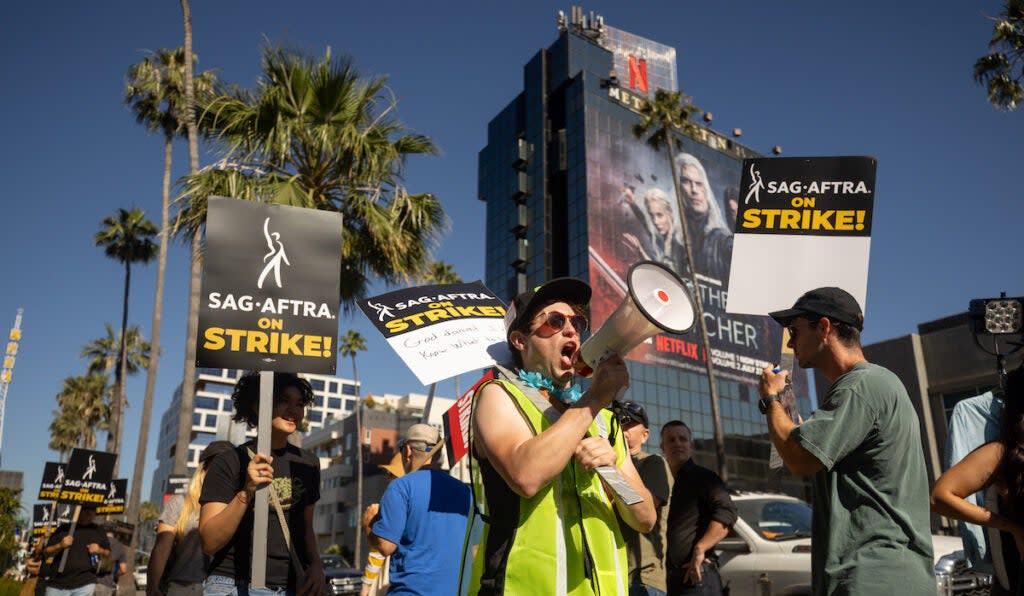New Contracts for Writers, Actors and Directors Could Cost Studios an Additional $600 Million Annually

As Hollywood production has been upended by the first double strike in more than 60 years, Moody’s debt analyst Neil Begley is estimating that the studios could end up collectively spending an additional $450 million to $600 million annually on a new three-year contract for SAG-AFTRA, the WGA and the DGA.
“There is great play in these estimates, and some of this increased cost, particularly for television production, is likely to be passed on to buyers,” Begley wrote in a report published Monday.
Begley emphasized that the emergence of multiple streaming platforms and greater percentage of original programming being aired has resulted in an “unprecedented demand” for TV content that has “created scarcity of production facilities, equipment, workers and other critical elements.”
“It has become extraordinarily difficult, if not impossible, to preempt completely the effect of a strike by accelerating production,” he added. “We believe the actors’ strike announcement will make the writers more confident.”
Moody’s warns that in the event of a protracted strike, movie theater operators such as NAI Entertainment Holdings, Vue Entertainment, AMC Entertainment and Cineworld would be the most at risk due to “their nearly complete dependency on new product.”
“Theatrical exhibitors are already strained from damage caused by the COVID pandemic such as lighter release schedules that followed and shortened distribution windowing. They also have mostly weaker balance sheets and credit ratings,” Begley explained. “In a prolonged strike in which new theatrical Hollywood tentpole product is spread more thinly or runs dry, these companies could face earnings, cash flow and liquidity pressures.”
After exhibitors, broadcast television and cable networks are also exposed, “given they are already in secular decline with rising costs to consumers and a shrinking value proposition relative to direct-to-consumer video-on demand streaming services such as Netflix,” Begley added.
He noted that each streaming platforms’ risk will be dependent upon how much library content rights they have, how well prepared their pipelines are for a strike and how diversified their content production and rights are.
“We believe some may actually see a short-term boost to cash flow as they did during the pandemic, when production was halted and production working capital spending stopped, boosting cash flows,” he continued. “A long-lasting strike will most affect companies that have little or no financial flexibility, such as those that are highly leveraged and have low single ‘B’ or ‘Caa’ credit ratings; those very weakly positioned relative to their existing credit ratings; those facing secular pressure already; and those that rely heavily on studio output for the bulk of revenue.”
If a strike lasts six months or longer, Moody’s predicts that smaller production companies, local television broadcast stations, all of the companies that supply services surrounding production and even agencies that represent talent will feel the pain.
“Ultimately, we believe the strike will be a temporary phenomenon and unlikely to cause the investment-grade companies’ credit quality to weaken significantly enough to pressure their ratings in isolation,” Begley added. “But it could cause some disruption and ultimately a settlement is highly likely to result in higher costs for all producers and distributors, and potentially for consumers, which could moderately hurt subscription growth and churn rates.”
The Moody’s report comes as some on Wall Street have shrugged off the near-term impact of the double strike, with most streaming companies expected to be impacted sometime in 2024. But as media earnings season ramps up starting on Wednesday, executives will likely field questions on how the double strike will impact their financials and strategy in the months ahead.
Netflix will report on Wednesday, followed by Comcast on July 27, Warner Bros. Discovery on Aug. 4, Paramount on Aug. 7 and Disney on Aug. 9.
Also Read:
Netflix Faces a Tough Balance as It Kicks Off Hollywood Earnings Amid a Double Strike | Charts


